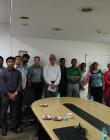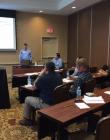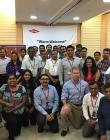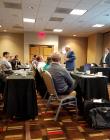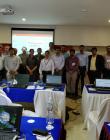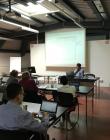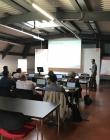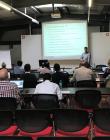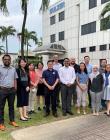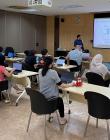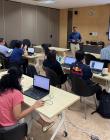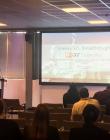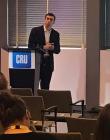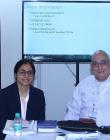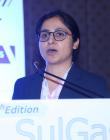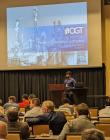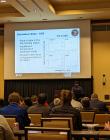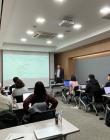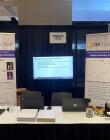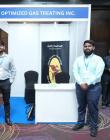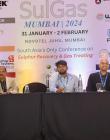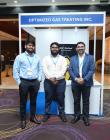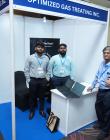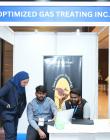Training & Workshops
Training: We make training as personal as possible and of short enough duration that it can be conducted via WebEx, Teams, or Zoom without you having to leave the comfort of your conference room or office. Although only relatively brief sessions (up to about an hour) can be conveniently accommodated via the internet, these platforms are much more accessible and cost effective than in-person events requiring travel and absence from work. If you or your colleagues are interested in a personalized tutorial, please contact Simon Weiland via this email link or by phone at +1 512 312 9424 (Office) or +1 214 533 6016 (Cell). We can provide training anywhere you happen to be in the world.
Workshops are generally half-day to three-day events and are conducted face-to-face. Workshops address broader topics than Training sessions and focus not just on using our software products but they also take a deeper dive into the technologies involved in various processes. If your company is interested in hosting a workshop we'd be happy to oblige and travel to your facility. Just let us know. Currently scheduled workshop sessions are listed here.
Upcoming Workshops
Register
CANCELED
Carbon Capture Masterclass with tour of HVC Pilot Plant in Alkmaar
Co-Hosted by Hovyu and Optimized Gas Treating, Inc.
Dates:
April 2nd – 4th, 2025
Location:
Rotterdam, the Netherlands
Cost:
Euro€ 2,500 (early bird)
Euro€ 1,800 Academia (only 5 slots available)
Time
Day 1
Day 2
Day 3 (not aligned with timetable)
08:30 – 09:00
Welcome
Welcome
09:00 – 10:30
Amine Absorption – Introduction
Basic Chemistry review and properties overview
Amines overview
Why amines are used for CO2 capture
Types of amines used
Heat requirements and process characteristics (optimal range of operation) – Understanding the SRD curve
Optimal solvent circulation
Why there is minimal energy
Estimate the minimum energy
Bus to HVC in Alkmaar
10:30 – 10:45
Coffee Break
Coffee Break
Lessons learned from campaigns
10:45 – 12:15
CO2 Capture Process
Basic configuration (main equipment roles)
Energy requirements
Advanced process modification
Common amine contaminants
Effect of common contaminants in amine solvents
Solvent degradation
Solvent emission mitigation and management techniques
Current projects
12:15 – 13:30
Lunch
Lunch
Plant visit + Q&A
13:30 – 15:00
Amine absorption – Part 2
Basic Flow Diagram (and some advanced configurations)
Basic flowsheet, role of all equipment
Intercooler, Mechanical Vapor Recompression, Split-flow, etc.
Why use process modifications
ProTreat Advanced – Optimization and Excel COM basics
Lunch and return to Rotterdam
15:00 – 15:30
Coffee Break
Coffee Break
15:30 – 16:15
ProTreat Overview – Setting up a simulation and results extraction
Breakout Rooms – Hands-on activities
16:15 – 17:20
Breakout Rooms – Hands-on activities
Examples of simulation a basic flow diagram
19:00
Workshop Dinner
Where: Houston, TX
When: TBD
Presenters: TBD
* Attendees are responsible for hotel reservations; however, a list of hotel recommendations will be provided upon request.
Agenda
Day 1: Gas Treating
- 09:00 – 09:30 Opening Remarks
- 09:30 – 10:15 Introduction to Optimized Gas Treating
- 10:15 – 10:45 Morning Break
- 10:45 - 11:30 Introduction to ProTreat
- 11:30 – 12:30 Lunch
- 12:30 – 13:30 Mass Transfer Rate Model (Predictive power and scientific phenomenological basis)
- 13:30 – 14:30 Amine Treating - Important Parameters
- 14:30 – 15:00 Afternoon Break
- 15:00 – 15:45 Amine Treating – Blended Amines
- 15:45 – 16:30 Amine Treating – Heat Stable Salts
- 16:30 – 17:00 End of Day 1 Q&A
Day 2: Gas Treating (Continued)
- 09:00 – 09:45 Acid Gas Enrichment and Selective Treating
- 09:45 – 10:30 MDEA and formulated MDEA based solvents for bulk and deep CO2 removal (Syngas and LNG)
- 10:30 – 11:00 Morning Break
- 11:00 – 11:30 CO2 Capture — How it differs from traditional treating & unusual behaviors
- 11:30 – 12:30 Lunch
- 12:30 – 13:00 Physical Solvents including HotPot and amine promoted HotPot
- 13:00 – 13:30 Glycol Dehydration including modeling Stahl columns
- 13:30 – 14:00 Afternoon Break
- 14:00 – 14:30 Caustic Treating
- 14:30 – 15:15 Corrosion
- 15:15 – 16:00 Sour Water Stripping including 2-stage stripping
- i. Important parameters and differences from amine regeneration
- ii. Tray efficiencies - the moving target
- iii. Phenolic vs. Non-phenolic Water
- 1. Common Contaminants
- a. HCN
- b. Phenols
- c. Alkanolamines
- d. Alkali metal cations
- e. Strong acid anions
- f. Hydrocarbons
- 2. Optimal Caustic Injection Points
- iv. Corrosion and Metallurgy Considerations
- v. 2-Stage Stripping
- 16:00 - 16:15 COS and Mercaptans Removal
- 16:15 - 16:30 Hybrid Solvents
- 16:30 – 17:00 Gas Treating Wrap-Up, Q&A
Day 3 : Sulphur Recovery Units
Register
- 09:00 – 09:30 Claus Process Overview
- 09:30 – 10:00 Feed Preparation
- a. Refinery vs. gas plant feeds
- b. Acid Gas knockout
- c. Combustion air
- 10:00 – 10:30 Morning Break
- 10:30 – 11:30 Reaction Furnace
- a. Overview of one and two zone furnace designs
- b. Ammonia destruction
- c. BTEX & hydrocarbon destruction
- d. CS2 formation
- 11:30 – 12:30 Lunch
- 12:30 – 13:15 Waste Heat Boiler
- a. H2 & COS recombination reactions
- b. Sizing & rating
- c. Corrosion & reliability considerations
- 13:15 – 13:45 Condenser
- a. Sizing & rating
- b. Turndown studies
- c. Emphasis on differences vs. WHB
- 13:45 – 14:30 Converter
- a. Deactivation mechanisms
- b. Interpreting temperature profiles
- c. COS and CS2 hydrolysis
- d. Catalyst types and selection parameters
- 14:30 – 15:00 Afternoon Break
- 15:00 – 15:45 TGU
- a. Hydrogenation Reactor
- b. Incinerator
- c. SO2 breakthroughs
- d. pH – to control or not to control
- 15:45 – 16:00 Integrating the SRU with Upstream and Downstream Amine Units
- 16:00 - 16:15 CAPE-OPEN Capabilities in ProTreat/SulphurPro and Upcoming Features
- 16:15 – 16:30 Closing remarks
- 16:30 – 17:00 Sulphur Recovery Wrap-up, Q&A
Upcoming External Workshops
